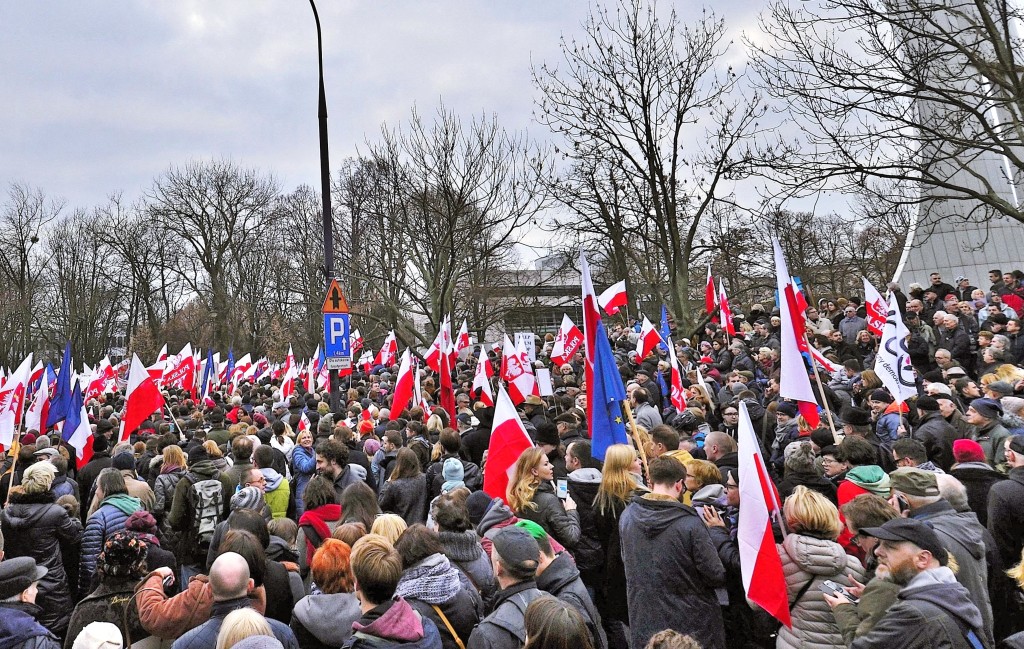The recent rise of conservative/nationalistic/patriotic tendencies as well as xenophobia and islamophobia in Poland is related to a similar trend in other EU states or even to phenomena accompanying the ongoing presidential campaign in the US. If we take a look at the situation in Europe, we will notice that nationalism begins to enter the political mainstream and the far right ceases to be just mere folklore, a curiosity (let’s look at France, Austria, Germany, Hungary). Nowadays, caring only about national interests, sovereignty of the one and only Homeland, hostility towards other nations, all become the defining features of a “European” attitude. This is also why xenophobia comes into the light, encouraging many people of a similar mono-ethnicly or mono-ethnic mindset to do the same.
We are witnessing a shift in the European history. European societies are moving away from the so far convinced about their influence elites which have their origins in the liberal/democratic circles. In the aftermath of the British referendum we do not really know how long will the European project exist. The hyper-optimistic technocratic and ideological courses advocating European standards (which I myself still remember emerging in the wake of Poland’s accession to the EU) have been long gone. The diminished economically and politically middle class faced with the need for a more stable economical situation, better opportunities and as a protest against the aforementioned European elites, starts supporting revolutionary anti-establishment, anti-liberal or even anti-democratic political movements. Many European states exerience on the one hand: a rivalry in who can come up with the best nationalistic and anti-immigrant slogans between the conservative/sovereign/nationalistic political mainstream and the far right; and on the other: the far right (more authentic in this respect) gaining more and more popularity and power is being (as opposed to the unpopular left) the only real and credible alternative to the political mainstream (let’s llok at Austria, France, Germany, Denmark, the Netherlands, Sweden, Finland, Great Britain, Hungary or Slovakia).
Paradoxically, it seems that in Poland, twelve years after the EU accession, Polish people (well, some of them, but still) have already adopted a tendency to think in terms of the European level. However, when the EU societies undergo re-nationalization, they become increasingly euroskeptic. Despite the fact that the support for the European Union is still relatively high in Poland1, we start thinking in the way that focuses on the EU issues (even when they do not apply to our state that much): Islamic terrorism, migration wave, decreasing trust in the succes of the multicultural model, Eurozone crisis, bankrupcy of Greece. In the face of a strong criticism towards the European governing elites – the announcement of the death of the multicultural Europe by Angela Merkel back in 2013 and a similar stance of the former French President Nicolas Sarkozy or David Cameron – anti-multicultural attitudes represented by conservative/nationalistic and far-right communities are being legitimized by the public.
We can see that in the states with long-established multicultural traditions with a relatively successful multicultural models such as the Netherlands or Germany (the latter with relatively recent experiences with ethnic minorities) the sole idea of muli-culturalism faces strong criticism. This proves that there exists a crisis of multiculturalism and closing of societies within their own ethnic groups, what breaks off a kind of continuum of the integrative function of globalization and instead makes us face a further disintegrating us globally processes such as economic commotions (2008), ethnic conflicts and religious fanatisms, ultranationalism, authoritarian practices of governments, political violence and terrorism.
Moreover, we may observe what – apart from the refugee crisis – has a great impact on refusing accepting immigrants by the Polish society – yet another transformation of the danger of global terrorism by Islamic radicals. This terror affects no longer just Bagdad, Beirut, Bali, Kenia or the United States but often our European neighbours – France, Belgium or Great Britain. In this context, the global dimension of Islamophobia which developed significantly after the 9/11 in the US, gets recently even more fierce in Europe, which is now endangered by attacks and refugee wave of the mostly Muslim population from the Middle East and Africa on an unprecedented scale.
Awaiting th data by DARE, I try to figure out the reasons for the lack of willingness in the Polish society to help the refugees. I believe that the globally well-rooted Islamophobia plays here a key role. Another factor, apart from the abovementioned rise in the nationalistic tendencies, is in my opinion the attempt to improve the living conditions of the Polish people as a part of the “relative transformative stabilization of the past 26 years and rejection of the idea that we would take up yet another challenge and the costs and efforts related to it”.
As a pragmatist, I believe that the shocking scale of the migration shall be perceived as an opportunity for Poland – especially in the long-term perspective – and for the society accepting immigrants in the economic, demographic, social and cultural dimesions. Despite the fact that the unemployment rate in Poland is on the one-digit level, we already do face a deficit in labor force supply in respective industries (approximately 90 thousands) and the prognoses by Deloitte and DNB Poland Bank indicate that in the forthcoming years the negative balance will be further reinforced. Let us bear in mind that we are on the brink of a demographic catastrophy. According to the Polish Central Statistical Office, until 2050 Poland’s population will decrease by 4.5 million i.e. by 12%. It is not certain whether the recently introduced pro-family governmental policies will put a halt this negative trend. Even if they do, they are not an answer to the problem if on the European level multiculturalism begins to be identified with danger (to our identity or safety) rather than with an opportunity for development.
The article was originally published in Polish at liberte.pl
Translated by Olga Łabendowicz



